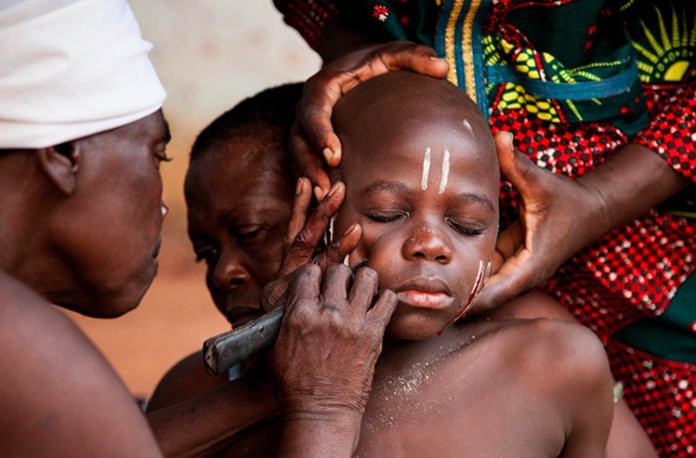One common practice among parents and guardians in our society is the making of tattoos or permanent skin marks on their children and wards.
Such marks or tattoos are often hinged on ethnic and sometimes ritual purposes of identification or self-protection.
For example, many ethnic groups have distinct tribal or skin marks etched on faces, arms or other parts of the body with which they can be easily identified even from a reasonable distance.
Some exponents of this have argued that tatoos or ethnic marks are also needed, as according to them, this will go a long way in preserving the peoples’ cultural identity. It has even been further argued that in times of war, such distinct ethnic marks or tattoos serve as an easy mark for personal identification and safety.
This must have to a large extent accounted for preponderance of such practice in the days of yore.
While this might have found some justification in the dark era of human history, same cannot definitely be true for modern day society.
Today, you do not need tribal marks for personal identification. Neither is ethnic or ritual marks needed for security. In modern times of war, uniforms and flags can easily differentiate the warring parties not tribal marks.
Besides, such crude practice, more often than not, comes with pains and permanent injuries that can disfigure the child. This unlawful and barbaric act amounts to needless and avoidable torture.
Today, the law frowns at such barbaric practice as it inflicts pains, agony and permanent scars and could disfigure the child.
The Child’s Right Act, for instance, in very clear terms deprecates and outlaws this practice and indeed makes it a punishable offence.
According to Section 24 (1) of the Act, “No person shall tattoo or make a skin mark to be made on a child”
Sub-section 2 of the same section also penalizes the practice thus “A person who tattoos or makes a skin mark on a child commits an offence under this Act and is liable on conviction to a fine not exceeding five thousand naira or imprisonment for a term not exceeding one month or to both such fine and imprisonment”
From the above clear provisions of the Act, there is no doubt that tatoo or ethnic mark on a child constitute a serious offence attracting penalties.
For the avoidance of doubt, the Act states “skin mark means any ethnic or ritual cuts on the skin which leaves permanent marks”
It is, therefore, no longer business as usual to make tattoos or tribal marks on children. Many children have suffered this but could not do anything because they in the past were helpless but the law is now here to the rescue.
So a child can now take action against any parents or guardian for any such cuts in the name of culture. It is, however, disturbing that inspite of this, tattoos and tribal marks still persist in some communities, especially in rural areas.
This, some have blamed on ignorance while others trace it to unwillingness of some people to break away from crude barbaric practice and come to terms with modernity.
Which reason that accounts for continued patronage of tattoos and tribal marks, the perpetrators should know that the game is up and that ignorance of the law is no excuse. It is trite law that any custom that is crude, barbaric and repugnant to natural justice, equity and good conscience must be heaped to the infamous and odious dustbin of history.
Tattoos and ethnic skin marks practice as a custom, especially when they extend to permanent marks are no doubt repugnant to ethos of modern society.
The law will definitely catch up with whoever encourages or indulges in such obnoxious and primitive practice.
It is, therefore, the duty of all civilized and law abiding citizens to report the perpetrators of this ugly act to the relevant authorities for necessary action.
We must all say no to tattoos, ethnic or ritual skin marks as they constitute offence under our laws and unacceptable to civilized society. We should also strive at all times not to be found on the wrong side of the law.


